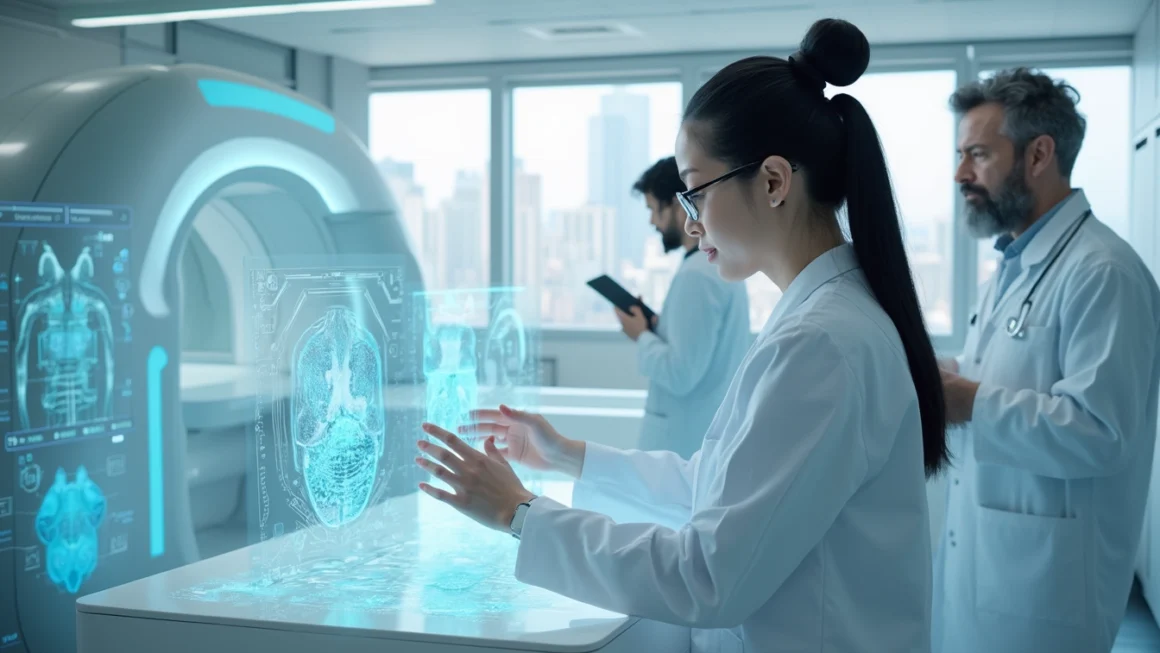The Rise of AI in Healthcare: Transforming Diagnosis and Treatment
Table of Contents
Artificial Intelligence (AI) is rapidly revolutionizing the healthcare industry, offering groundbreaking solutions for diagnosis and treatment. As technology continues to advance, AI-powered tools are becoming increasingly sophisticated, providing healthcare professionals with valuable insights and improving patient outcomes.
AI’s Impact on Medical Imaging
One of the most significant areas where AI is making strides is in medical imaging. Advanced algorithms can now analyze X-rays, MRIs, and CT scans with remarkable accuracy, often surpassing human capabilities. These AI systems can detect subtle abnormalities that might be missed by even the most experienced radiologists, leading to earlier and more accurate diagnoses of conditions such as cancer, heart disease, and neurological disorders.
Enhancing Drug Discovery and Development
AI is also accelerating the process of drug discovery and development. By analyzing vast amounts of data from clinical trials, scientific literature, and genetic information, AI algorithms can identify potential drug candidates much faster than traditional methods. This not only reduces the time and cost associated with bringing new medications to market but also increases the likelihood of developing effective treatments for various diseases.
Personalized Treatment Plans
Another exciting application of AI in healthcare is the development of personalized treatment plans. By analyzing a patient’s genetic makeup, medical history, and lifestyle factors, AI systems can recommend tailored treatment options that are most likely to be effective for individual patients. This approach, known as precision medicine, has the potential to significantly improve treatment outcomes and reduce adverse effects.
Challenges and Ethical Considerations
While the potential benefits of AI in healthcare are enormous, there are also challenges and ethical considerations that need to be addressed. These include:
- Data privacy and security concerns
- The need for regulatory frameworks to ensure the safety and efficacy of AI-powered medical devices
- The potential for AI to exacerbate existing healthcare disparities
- The importance of maintaining human oversight and decision-making in critical medical situations
The Future of AI in Healthcare
As AI continues to evolve, its role in healthcare is expected to expand even further. Future applications may include:
- AI-powered virtual health assistants for remote patient monitoring and support
- Predictive analytics to identify patients at risk of developing certain conditions
- Automated surgical systems for more precise and less invasive procedures
- AI-driven public health interventions to prevent disease outbreaks
The integration of AI in healthcare holds immense promise for improving patient care, reducing costs, and advancing medical research. As with any transformative technology, it’s crucial to approach its implementation thoughtfully and responsibly.
The Role of Human Expertise in the AI Era
While AI is transforming healthcare, it’s important to note that human expertise remains crucial. AI tools are designed to augment and support healthcare professionals, not replace them. The combination of AI capabilities with human knowledge and intuition is likely to yield the best outcomes for patients.
Collaborative AI: Enhancing Healthcare Team Performance
One exciting development is the concept of collaborative AI, where AI systems work alongside healthcare teams to improve decision-making and patient care. For example, AI can assist in analyzing complex medical data, suggesting potential diagnoses or treatment options, which healthcare professionals can then evaluate and refine based on their expertise and understanding of the patient’s unique circumstances.
AI in Medical Education and Training
AI is also playing an increasingly important role in medical education and training. Advanced simulation systems powered by AI can provide medical students and professionals with realistic, immersive training experiences. These systems can adapt to the learner’s skill level, providing personalized feedback and helping to hone critical decision-making skills in a safe, virtual environment.
Improving Healthcare Accessibility
One of the most promising aspects of AI in healthcare is its potential to improve accessibility, particularly in underserved areas. AI-powered telemedicine platforms can connect patients with healthcare providers remotely, while AI-driven diagnostic tools can help bridge the gap in areas with limited access to specialist care.
For instance, AI systems can analyze medical images or symptoms and provide preliminary assessments, which can then be reviewed by healthcare professionals. This approach can help prioritize cases and ensure that patients receive timely care, even in resource-constrained settings.
The Importance of Ethical AI Development
As AI becomes more prevalent in healthcare, it’s crucial to ensure that its development and implementation are guided by ethical principles. This includes:
- Ensuring transparency in AI decision-making processes
- Addressing potential biases in AI algorithms to ensure equitable care for all patients
- Maintaining patient privacy and data security
- Establishing clear guidelines for the use of AI in critical medical decisions
Healthcare organizations and technology companies must work together to develop AI solutions that are not only effective but also ethical and patient-centered. Automation platforms can play a crucial role in streamlining the integration of AI technologies into existing healthcare systems, ensuring seamless and efficient implementation.
Conclusion: Embracing the AI Revolution in Healthcare
The integration of AI in healthcare represents a significant leap forward in our ability to diagnose, treat, and prevent diseases. As we continue to explore and refine these technologies, we have the opportunity to create a healthcare system that is more efficient, accurate, and accessible than ever before.
However, it’s important to approach this revolution with a balanced perspective. While embracing the potential of AI, we must also be mindful of the challenges and ethical considerations it presents. By fostering collaboration between technologists, healthcare professionals, and policymakers, we can ensure that AI is developed and implemented in ways that truly benefit patients and society as a whole.
As we look to the future, it’s clear that AI will play an increasingly important role in shaping the healthcare landscape. By staying informed, adaptable, and committed to ethical practices, we can harness the power of AI to create a healthier, more equitable world for all.




